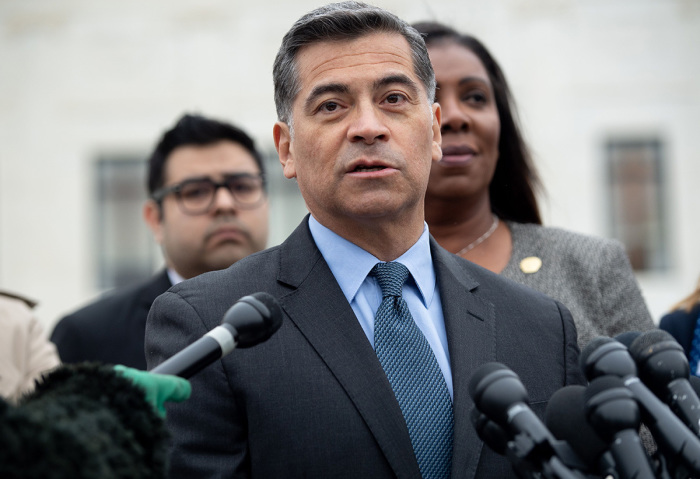Biden admin. takes new steps to combat Texas abortion law, tells abortionists 'we have your back'

As litigation surrounding Texas' controversial heartbeat abortion law continues, the Biden administration has unveiled new actions it is taking to ensure that women in the Lone Star state can obtain “safe and legal abortions.”
The Biden administration continues its efforts to nullify Texas Senate Bill 8 bill after a federal judge rejected the U.S. Department of Justice’s request to block the law as legal challenges to the measure move forward.
The law, which took effect Sept. 1, bans abortions after a fetal heartbeat can be detected, usually around six weeks gestation. Additionally, the law allows private citizens to sue abortion providers and those who help women obtain illegal abortions.
On Friday, the U.S. Department of Health and Human Services introduced a “three-pronged Department-wide response” to Senate Bill 8 designed to “protect reproductive health care for Texans” and “bolster access to safe and legal abortions in Texas.” In a statement, HHS Secretary Xavier Becerra declared that “every American deserves access to health care no matter where they live — including access to safe and legal abortions.”
Critics of the bill maintain that Senate Bill 8 violates the central holding of the 1973 Supreme Court case Roe v. Wade, where the justices ruled that a woman has a constitutional right to terminate her pregnancy before viability.
“HHS is taking actions to support and protect both patients and providers from this dangerous attack on Texans’ health care," Becerra stated. "Today we are making clear that doctors and hospitals have an obligation under federal law to make medical decisions regarding when it’s appropriate to treat their patients. And we are telling doctors and others involved in the provision of abortion care, that we have your back."
The first part of HHS’ “three-pronged” approach to Senate Bill 8 consists of increased funding for family planning services. Specifically, the HHS Office for Population Affairs plans to “award additional funding to Every Body Texas, a current Title X family planning grantee, to respond to the anticipated increase in clients’ needs for emergency contraception and family planning services.”
HHS also vowed to enforce the Church Amendments, protecting “health care personnel from discrimination related to their employment because they performed or assisted with a lawful abortion.” The Church Amendments also protect “health care personnel from discrimination who object to performing abortion, sterilization, and biomedical or behavioral research activities because of their religious beliefs or moral convictions."
“Today’s guidance outlines protections that prohibit recipients of grants, loans, contracts, or loan guarantees under the Public Health Service Act from discriminating in the employment, promotion, or termination of employment of any physician or other health care personnel because the individual performed or assisted in the performance of an abortion," the statement reads.
The third aspect of the HHS strategy to “bolster access to safe and legal abortions in Texas” involves the enforcement of the Emergency Medical Treatment and Labor Act. In response to the Texas law, the Centers for Medicare & Medicaid issued a memorandum explaining the medical community’s obligations to “patients who are pregnant or experiencing pregnancy loss” under the Emergency Medical Treatment and Labor Act.
“A physician’s professional and legal duty to provide stabilizing medical treatment to a patient who presents to the emergency department and is found to have an emergency medical condition preempts any directly conflicting state law or mandate that might otherwise prohibit or prevent such treatment,” the memorandum states.
The memo stated that “ectopic pregnancy, complications of pregnancy loss, or emergent hypertensive disorders" meet the standard for “emergency medical condition," while "dilation and curettage (D&C), removal of one or both fallopian tubes, [and] anti-hypertension therapy" qualify as “stabilizing medical treatment.”
The Wall Street Journal reported earlier this month that legal experts say that the Justice Department could attempt to strip federal funding and determine if there are federal facilities in Texas that could provide abortions.
Pro-life lobbying organizations criticized the Biden administration’s efforts to undermine the Texas law.
“There are no lengths the Biden administration won’t go to in their drive to prop up the abortion industry and impose abortion on demand up to birth nationwide, on a public that resoundingly rejects their agenda,” said Marjorie Dannenfelser, president of the Susan B. Anthony List.
“Texas is not California, no matter how hard Xavier Becerra tries to export his pro-abortion legacy. All Americans deserve the right to debate, find consensus and enact laws that reflect their values — that’s how democracy works. Yet for almost fifty years, the Supreme Court has tied the hands of state legislators, and now Joe Biden and his radical allies want to shut down the debate permanently."
As the executive branch continues to evaluate its options for defeating Senate Bill 8, the U.S. House of Representatives is working to codify Roe v. Wade into federal law. Shortly after the Supreme Court declined to block Senate Bill 8 from going into effect, House Speaker Nancy Pelosi, D-Calif., announced that “the House will bring up Congresswoman Judy Chu’s Women’s Health Protection Act to enshrine into law reproductive health care for all women across America.”
A federal judge in Texas has scheduled arguments in the challenge to Senate Bill 8 for Oct. 1. Meanwhile, the Supreme Court is expected to rule on the constitutionality of Mississippi’s 15-week abortion ban. The justices’ decision in the Mississippi case could have significant implications for abortion law in the U.S. A ruling in favor of Mississippi, which seeks to uphold the ban, could weaken the precedent set by Roe v. Wade and give states more freedom to enact abortion restrictions.
Ryan Foley is a reporter for The Christian Post. He can be reached at: ryan.foley@christianpost.com





























